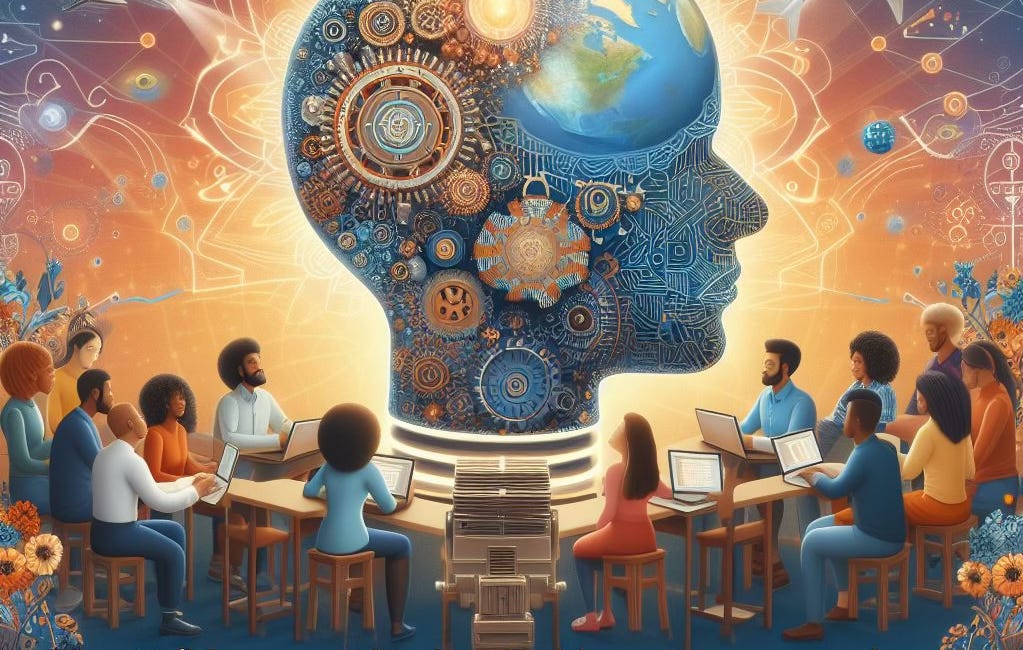How might we create consciousness-raising songs that engage learners in transformational learning experiences to cultivate equity meta-governance and regenerate Mother Earth?
How might we co-create human-AI synergies to evoke slow thinking, deep learning, generative dialogues, and complexity skills for redressing our meta-crisis and solving poly-crisis?
The complex questions (above) are broken down into a series of simple questions about addressing wicked problems. Wicked problems are complex because they have no single, simple, definitive, or final solutions, with no right-wrong answers.
Our educational systems have yet to develop lifelong intergenerational learning processes for solving our complex web of self-inflicted ethical, political, economic, social, educational, environment, climate, and planetary problems.
How might we write lyrics and AI-generated music to:
Raise awareness about our wicked problems facing society and the planet?
Evoke curiosity in deep learning about our wicked problems?
Create dialogue spaces for opening, inspiring, and aligning our mindsets to addressing our global challenges together?
Inspire learners to engage in lifelong inter-generational learning about solving our wicked problems?
Listen to Opening Mindsets
Listen to two versions. Which version do you prefer?
Use these songs to evoke generative dialogues in groups of 3-4 persons (in zoom calls or in-person events) to co-create shared meaning and understanding about opening mindsets. With open mindsets, we can untap our hidden potential to solve our wicked problems.
How might we evoke curiosity in developing complexity skills in addressing wicked problems?
Complex sentences and questions convey nuanced implications about the interconnectedness of our wicked problems. Simple sentences add clarity. However, simple questions risk evoking reductionist thinking that is incapable of solving wicked problems.
Simple sentences
Imagine creating living neobooks and learning communities for developing the governance to co-create a fair, free, and flourishing future. These learning experiences empower people to develop inquiry skills and co-create human-AI synergies for facilitating deep learning and generative dialogues. We can use these learning experiences enables to develop the skills for addressing systemic power abuse dynamics that set up interconnected, self-inflicted complex problems.
Complex sentence
Imagine developing living neo-books, learning communities, and equity meta-governance that empower people to cultivate inquiry skills, co-create human-AI synergies, and develop the deep learning and complexity capabilities for redressing our meta-crisis of systemic power abuse dynamics that set up our poly-crisis: our complex entanglements of self-inflicted wicked problems.
Use perplexity-AI to explore on the meaning and implications of the sentence.
Moral parables, ethical memes and simple rules are invaluable for daily living, but they are not designed to address the complexities of redressing our meta-crisis. Otherwise, we would not be in such a pickle.
How might we emancipate learners to develop the AI inquiry skills for cultivating ontological and complexity skills to tolerate uncertainty and solve our wicked problems?
Use perplexity-AI to explore on the meaning and implications of this question. And review 50 strategies.
An ethical purpose of music is to inspire us to examine and explore our positive and negative reactions to the lyrics. What we resonate with positive emotions, we will affirm and reinforce our mindset dispositions on what we think, perceive, and feel.
We can learn the most about the functioning of our mindsets from comparing what we react for and against in the lyrics. What lyrics do we accept and reject. These reflexes are more often, but not always, reflect fast-thinking reactions.
How might we become truly open to understanding why we think, perceive, and feel the way that we do?
This song is an invitation for reflection-on-actions and opening our mindsets.
How might we use songs to engage us in generative dialogues to:
Understand what our reactions say about how we think, perceive, and feel?
Use some of our negative reactions to provide insights into our closed-mindedness?
Avoid becoming fixated on a particular heuristic, paradigm, or metaphor?
Open our minds to new ways of how we might think, perceive, and feel differently about thinking, perceiving, and feeling?
Version 2
Verse:
Closing mindsets, closing doors,
Content marketing machines teaching,
What to think, not how to think,
Indoctrinate thoughts, perceptions, feelings,
Cult trances, binding blind loyalties,
Fixated on certainty and simplicity,
O, the perils of reductionism,
Self-righteous fundamentalism,
Endless dysfunctional polarizations
Explore the meaning of this verse.
Chorus:
Imagine living neobooks, learning communities,
Learning together about equity meta-governance,
Fair rules, fair games, fair plays, opportunities, and rewards,
For all, on a regenerating Mother Earth, Pachamama.
Verse 2:
Reductionism atomizes, fragments, isolates,
Sets up stress, loneliness, despair, pointlessness,
Ethical voids without moral meaning, disabled sense-making,
Devoid of shared higher purposes, callings.
Chorus:
Bridge 3:
Sages-on-the-stage, mansplaining,
Trapping future generations,
Locked down in old legacy thinking,
Not moving the transformational needle.
Chorus
Outro verse:
Opening doors, opening mindsets,
Liberating guides on the stage enabling,
Emancipating lifelong intergenerational learning,
How to think and learn, about how to think and learn,
Zooming out to meta-cognition, meta-thinking
Meta-emotions, meta-feelings,
Meta-perceptions, multi-perspectives,
To cultivate never-ending ethical causes.
Use perplexity-ai to elaborate on the differences in the meaning and implications of:
Learn more about meta-governance.
How might we, as learning designers & educators, co-create exponential human-AI synergies to cultivate equity meta-governance, unravel our meta-crisis, & mitigate against & adapt to our poly-crisis?
Amplify human-AI synergies. Credit to DALL-E. Prompts by Rick Botelho, MD





